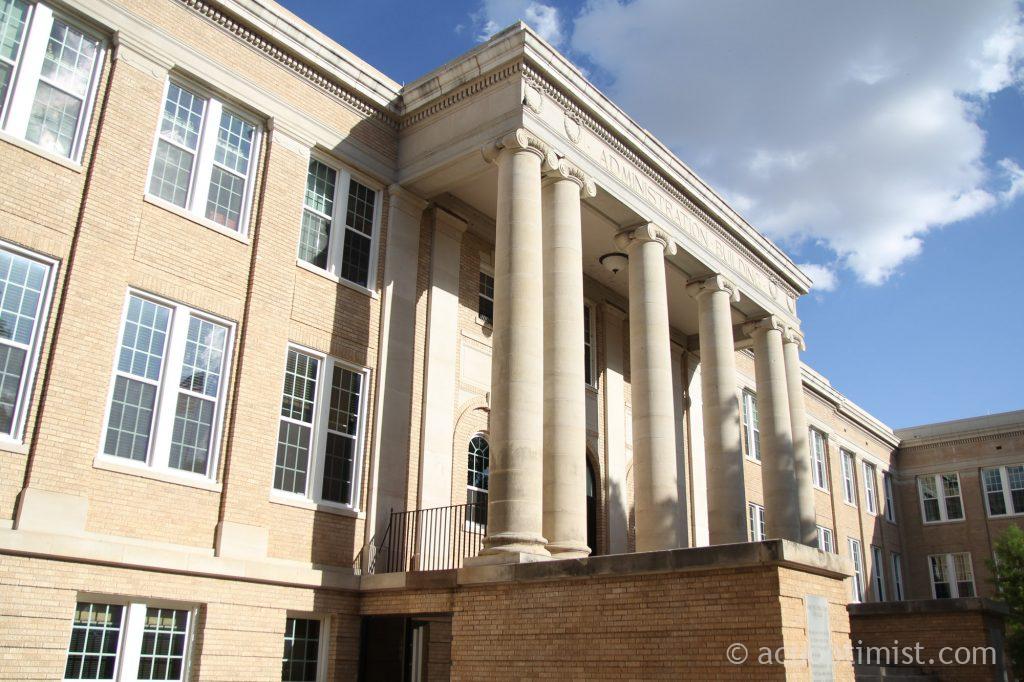“This elevator is kinda scary to use,” a female student tells her friend as they load up on the ancient contraption in the Hardin Administration building.
“Sure is,” a man adds, wheeling by in his chair.
The difference between the two? One is able-bodied and the other isn’t. One needs to use the elevator and the other doesn’t.
What’s similar? They both can see that the administration building, along with many others across campus, is in desperate need of some renovations.
Wait, let’s back up.
“Able-bodied” is a bit tone-deaf, isn’t it? Who am I to decide who can and cannot do something with their body?
Take my older sister, Annie, for example. Legally, she is handicapped. But if you could see that girl on a mission – well, you’d disagree with that statement fully.
Even Annie, who has only ever been on campus only a handful of times – moving me in or supporting me in Sing Song – has taken note of ACU’s shortcomings when it comes to giving all students equal opportunity, or fulfilling their individual needs.
“There are NOT enough handicap parking spaces,” she told me in frustration. “I had to park down the street!”
I had never even thought about that, but many on campus have. And it’s not just the parking spaces that need some attention.
But what can ACU do? The university is fully compliant with the Americans with Disabilities Act of 1990 and section 504 of the Rehabilitation Act. The accessibility statement reads, “Abilene Christian University is dedicated to removing barriers and opening access for persons with disabilities.”
So, according to the law, there are technically enough parking spaces on campus, but since when is just enough okay?
Corey Ruff, associate vice president for operations, said the university is always looking to make campus a better place for all students, but sometimes barriers make that quest a lot more difficult. For example, major projects like the renovation of elevators, can be expensive and time-inducing – we’re looking at around a $250,000 price tag and a lot of hard labor. But luckily for ACU, employees like Corey prioritize these needs and shortcomings, no matter the obstacles that stand in the way.
“My whole career deals with eliminating barriers and designing the built environment,” Corey said. “It’s something very near and dear to my heart, so I take it very seriously.”
And according to Drew Bell, a third-generation Wildcat whose spina bifida doesn’t slow him down in the slightest, ACU does a pretty good job at accommodating students with physical needs, though some things do need improvement.
“The elevator in the administration building is at least a hundred years old. I can barely fit my wheelchair in there,” Drew said. “Other than that, I felt right at home as soon as I moved in here; it’s been awesome.”
So what does this university need? More money? Time? Of course, it never hurts for students and faculty to get a taste of the inconveniences many others experience on the daily.
Best Buddies, according to their website, is “the world’s largest organization dedicated to ending social, physical and economic isolation of the 200 million people living with intellectual and developmental disabilities.”
ACU once had an active Best Buddies organization on campus, which has since fizzled out, but what still remains are the lasting effects of their annual wheelchair challenge, where nominated participants temporarily used wheelchairs to get around campus. The challenge was created to educate students and faculty on the challenges faced by people with disabilities.
Chris Riley, associate professor of political science and criminal justice and 2019 participant of the challenge, said, “I think anything we can do to appreciate the different perspectives and lived experiences of others on our campus makes us a more compassionate and loving community.”
And while there is work still to be done, the university has made strides in the last few years – with even more on the way.
“We’re constantly making adjustments to campus,” Corey said. “At the end of the day, we want this campus to be accessible, safe, friendly and inviting to anyone that steps foot on it.”

